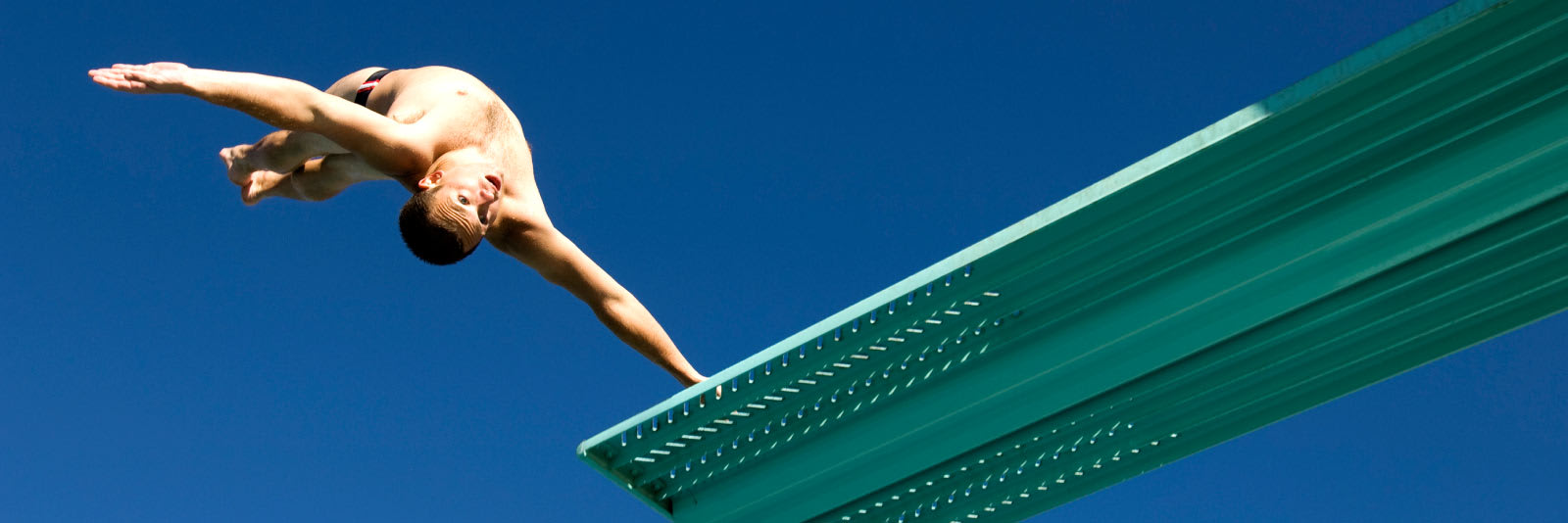Men’s College Diving Recruiting Scores and Scholarships

How good do you have to be to get recruited for college diving?
Most athletes focus on dive difficulty and scoring, but this is not the priority when it comes to getting recruited for college diving. Coaches care more about how well the athlete has mastered the basics and whether the athlete is versatile enough to perform dives from 1-meter and 3-meter springboards, as well as the 10-meter platform.
When it comes to recruiting events, college coaches typically attend events like National Junior Olympic, Senior Nationals, and National Championship where they expect to evaluate talent that best matches that of a college athlete.
The four basic skills college coaches look for in recruits
When evaluating recruits, college coaches look for athletes that have mastered these basic skills, which indicates they are capable of competing at the next level.
- Approach to the dive: The athlete’s progression forward to the edge of the board should be smooth, taking roughly three steps, with their body position straight, with arms straightforward, at their sides or over their head.
- Take-off: This is one of the most important skills to ensure the diver safely clears the board as they jump from the edge to execute the dive. Recruits should spend time practicing one-foot take-offs and landing on two feet, followed by departing from the board.
- Execution: While performing the dive, the athlete needs to be controlled, using proper technique as they prepare to enter the water. The dive should be held long enough for the judges to clearly evaluate their technique.
- Entry: Athletes enter the water either feet-first or head-first, depending on the dive they are performing. Athletes should keep their body nearly vertically straight, with feet together and toes pointed as they enter the water to create the least amount of splashing.
Do divers need to compete on a club diving team?
Yes, competing on a club diving team gives divers the best chance to get noticed by college coaches who tend to recruit at national level events attended by club diving teams. Club diving programs give athletes access to important recruiting events like National Junior Olympic, Senior Nationals, and National Championship, which high school diving programs do not. Joining a club team also allows recruits to practice and compete year-round and gives athletes an opportunity to develop their skill set and compete against top talent.
Additionally, while high school diving teams only compete on a 1-meter springboard, college programs compete on both 1-meter and 3-meter springboards and, occasionally, the 10-meter platform. This makes it hard for college coaches to evaluate a diver’s skillset at high school diving meets and championships. Instead, college coaches are more likely to scout divers who dedicate their time to train with a year-round club diving team.
How can I get college diving scholarships?
Competition is high for diving scholarships because the swimming and diving teams share a scholarship budget. In most cases, the swim team receives 85% of the scholarship budget, while the dive team receives 15%. For men, Division 1 colleges are allotted close to 10 scholarships each, while Division 2 colleges are granted 8 scholarships annually.
A recruit’s best chance of receiving an athletic scholarship is by demonstrating that they can perform technically strong dives that allow them to place high at the conference, regional and national levels. Why is this so important? College swim teams often rely on divers’ points to boost their point total and beat out competition.
Unlike swimming recruiting, which focuses largely on competition times, college diving coaches look at a recruit’s technique and understanding of the basics, rather than their scores, to evaluate talent.
To increase an athlete’s chance of getting recruited, divers should find a college program that will need the athlete’s skillset in the next year or two. This means the diver will need to accept that they may not score during their rookie year, but they could be a major asset to the team in the following years.
How is diving scored?
A group of five judges awards divers with a score out of 10 upon completion of the dive. After totaling the points awarded, the highest and lowest diving scores are removed, and the remaining points are added together. Once added, the total is then multiplied by the degree of difficulty, also known as the tariff. A dive’s degree of difficulty is determined by the elements of the dive.
What is a good score in diving? Judges score in whole or half points along the following lines:
- Completely failed — 0 points
- Unsatisfactory — 0.5 to 2 points
- Deficient — 2.5 to 4.5 points
- Satisfactory — 5 to 6 points
- Good — 6.5 to 8 points
- Very good — 8.5 to 10 point
While athletes tend to focus on the degree of difficulty and their diving scores during competition, college coaches pay closer attention to the athlete’s technique and mastery of the basics as they perform the dive.
The role of video in the diving recruiting process
Because an athlete never knows when they’re going to nail a dive, recruits are encouraged to record every dive they perform. Yes, this means having a camera ready during club or high school practice, as well as at competitions. This is a valuable recruiting tool for divers to capture all of their dive attempts and include strong performances in their highlight video to send to college coaches.
















